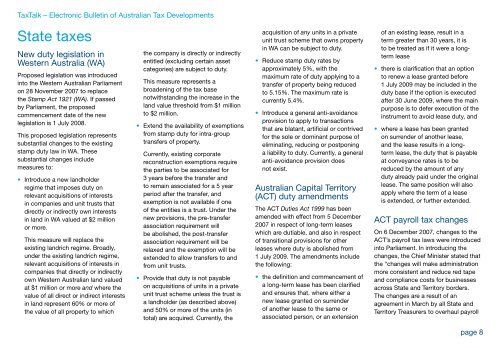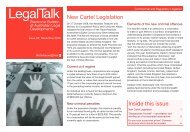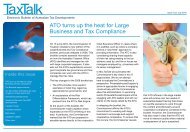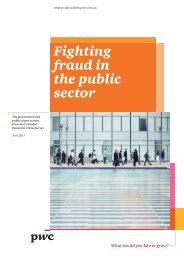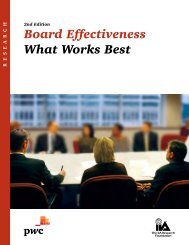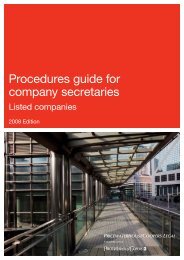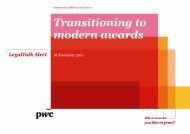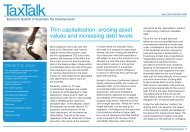Australian R&D tax incentives â another reason for ... - PwC
Australian R&D tax incentives â another reason for ... - PwC
Australian R&D tax incentives â another reason for ... - PwC
You also want an ePaper? Increase the reach of your titles
YUMPU automatically turns print PDFs into web optimized ePapers that Google loves.
TaxTalk – Electronic Bulletin of <strong>Australian</strong> Tax Developments<br />
State <strong>tax</strong>es<br />
New duty legislation in<br />
Western Australia (WA)<br />
Proposed legislation was introduced<br />
into the Western <strong>Australian</strong> Parliament<br />
on 28 November 2007 to replace<br />
the Stamp Act 1921 (WA). If passed<br />
by Parliament, the proposed<br />
commencement date of the new<br />
legislation is 1 July 2008.<br />
This proposed legislation represents<br />
substantial changes to the existing<br />
stamp duty law in WA. These<br />
substantial changes include<br />
measures to:<br />
• Introduce a new landholder<br />
regime that imposes duty on<br />
relevant acquisitions of interests<br />
in companies and unit trusts that<br />
directly or indirectly own interests<br />
in land in WA valued at $2 million<br />
or more.<br />
This measure will replace the<br />
existing landrich regime. Broadly,<br />
under the existing landrich regime,<br />
relevant acquisitions of interests in<br />
companies that directly or indirectly<br />
own Western <strong>Australian</strong> land valued<br />
at $1 million or more and where the<br />
value of all direct or indirect interests<br />
in land represent 60% or more of<br />
the value of all property to which<br />
the company is directly or indirectly<br />
entitled (excluding certain asset<br />
categories) are subject to duty.<br />
This measure represents a<br />
broadening of the <strong>tax</strong> base<br />
notwithstanding the increase in the<br />
land value threshold from $1 million<br />
to $2 million.<br />
• Extend the availability of exemptions<br />
from stamp duty <strong>for</strong> intra-group<br />
transfers of property.<br />
Currently, existing corporate<br />
reconstruction exemptions require<br />
the parties to be associated <strong>for</strong><br />
3 years be<strong>for</strong>e the transfer and<br />
to remain associated <strong>for</strong> a 5 year<br />
period after the transfer, and<br />
exemption is not available if one<br />
of the entities is a trust. Under the<br />
new provisions, the pre-transfer<br />
association requirement will<br />
be abolished, the post-transfer<br />
association requirement will be<br />
relaxed and the exemption will be<br />
extended to allow transfers to and<br />
from unit trusts.<br />
• Provide that duty is not payable<br />
on acquisitions of units in a private<br />
unit trust scheme unless the trust is<br />
a landholder (as described above)<br />
and 50% or more of the units (in<br />
total) are acquired. Currently, the<br />
acquisition of any units in a private<br />
unit trust scheme that owns property<br />
in WA can be subject to duty.<br />
• Reduce stamp duty rates by<br />
approximately 5%, with the<br />
maximum rate of duty applying to a<br />
transfer of property being reduced<br />
to 5.15%. The maximum rate is<br />
currently 5.4%.<br />
• Introduce a general anti-avoidance<br />
provision to apply to transactions<br />
that are blatant, artificial or contrived<br />
<strong>for</strong> the sole or dominant purpose of<br />
eliminating, reducing or postponing<br />
a liability to duty. Currently, a general<br />
anti-avoidance provision does<br />
not exist.<br />
<strong>Australian</strong> Capital Territory<br />
(ACT) duty amendments<br />
The ACT Duties Act 1999 has been<br />
amended with effect from 5 December<br />
2007 in respect of long-term leases<br />
which are dutiable, and also in respect<br />
of transitional provisions <strong>for</strong> other<br />
leases where duty is abolished from<br />
1 July 2009. The amendments include<br />
the following:<br />
• the definition and commencement of<br />
a long-term lease has been clarified<br />
and ensures that, where either a<br />
new lease granted on surrender<br />
of <strong>another</strong> lease to the same or<br />
associated person, or an extension<br />
of an existing lease, result in a<br />
term greater than 30 years, it is<br />
to be treated as if it were a longterm<br />
lease<br />
• there is clarification that an option<br />
to renew a lease granted be<strong>for</strong>e<br />
1 July 2009 may be included in the<br />
duty base if the option is executed<br />
after 30 June 2009, where the main<br />
purpose is to defer execution of the<br />
instrument to avoid lease duty, and<br />
• where a lease has been granted<br />
on surrender of <strong>another</strong> lease,<br />
and the lease results in a longterm<br />
lease, the duty that is payable<br />
at conveyance rates is to be<br />
reduced by the amount of any<br />
duty already paid under the original<br />
lease. The same position will also<br />
apply where the term of a lease<br />
is extended, or further extended.<br />
ACT payroll <strong>tax</strong> changes<br />
On 6 December 2007, changes to the<br />
ACT’s payroll <strong>tax</strong> laws were introduced<br />
into Parliament. In introducing the<br />
changes, the Chief Minister stated that<br />
the “changes will make administration<br />
more consistent and reduce red tape<br />
and compliance costs <strong>for</strong> businesses<br />
across State and Territory borders.<br />
The changes are a result of an<br />
agreement in March by all State and<br />
Territory Treasurers to overhaul payroll<br />
page


